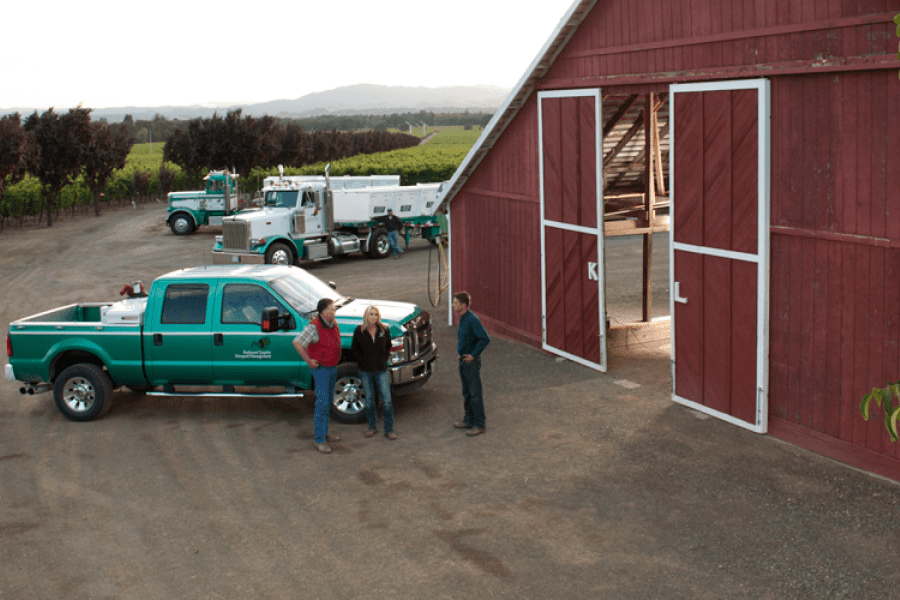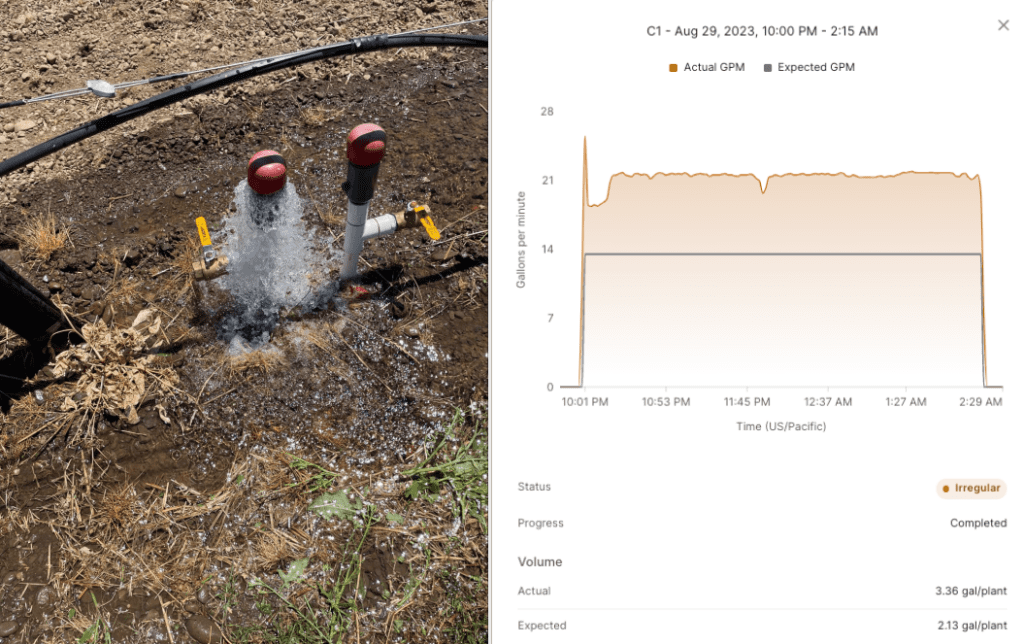Why Redwood Empire Vineyard Management Wants All Their Clients Using Lumo

“What really got me interested was when they said they wanted to come work with my irrigators.”
That’s Tyler Klick, Partner and Viticulturist at Redwood Empire Vineyard Management, talking about one of his first encounters with the Lumo team. In the early days, Devon, Lumo’s founder, worked as an irrigator at REVM for a couple weeks to better understand where current solutions were falling short.
“That was really interesting to me. Most of the time tech companies come in and try to tell me what I need, and it’s not even near. And here Lumo comes in and instead of telling me, they’re trying to learn what I actually need. That felt like a much better approach to me.”
Past automation solutions have been “clunky at best.”
Some form of irrigation automation has been around for Tyler’s entire career, but over the years very few systems have seen consistent use or good adoption. “You’re usually quickly back to sending an irrigator out there even though you just spent thousands of dollars setting this new system up.”
Even with recent advances in cell service and data coverage, a lot of them don’t communicate anything back to you about the status of your irrigations. “Someone always has to go check on them.”
The software platforms are difficult to use. And if something goes wrong, you’re soon wasting hours and hours troubleshooting yourself or hiring consultants and pouring even more money into the system. “Technical support from providers has generally been very poor and very slow. If you have a problem, it could be months.”
Tyler picked up the phone when Lumo first called because he’s known for a very long time that there must be a better way to automate irrigation and he was still committed to finding a tool that would help him deliver better irrigation outcomes without all the headache and hassle that the previous generation of solutions created.
“Our goal in irrigation is to use it as a tool to improve wine quality without compromising yield potential.”
Tyler was initially interested in trying Lumo because he wanted more control over his irrigations. He wanted greater precision to help better balance quality and yield. “It’s a fine line, pushing the vines by not giving them water, but also giving them enough water at the right time, both physiologically and phenologically when they need it.”
Manually opening and closing valves, and using the clunky solutions of the past, have limited REVM’s ability to water at ideal times of the day and their ability to track their actual water application. Irrigations could run an hour or two shorter or longer than intended, just depending on what was happening in the vineyard that day or if there was traffic on the highway. “Viticulturalists are often frustrated by irrigations going out when they shouldn’t have. Or others that haven’t gone out when they should have.”
Despite the promises of previous solutions, before Tyler found Lumo, irrigation was still largely a manual process, unreliable, tracked by hand, prone to error, and with no ability to automatically detect leaks. It was impairing Redwood’s ability to irrigate efficiently and effectively.
Because for Tyler, irrigation success boils down to two things: “no wasted water, and the vines have what they need to perform at an optimal level quantitatively and qualitatively.” The old way of irrigating was limiting Tyler’s ability to do both.
“There’s a night and day difference from the other irrigation automation systems we’re working with. It’s everything everyone else says they can do but Lumo actually does it.”
This past season, REVM deployed Lumo One smart valves into a vineyard they farm on their own behalf and two client vineyards they also manage.
Overall, Tyler’s been impressed with what he’s seen so far. He likes that Lumo gives him more control and more visibility into how his irrigation system is actually performing. “We found problems we didn’t know we had!”

Lumo immediately detects and alerts REVM's team to issues like this leaking air vent
The technical support has been outstanding. “When we have had issues, Lumo’s been out there before we even got there.”
He likes the irrigation scheduling and automatic notifications. “The software platform is extremely easy to use and functions very well. The valves have been reliable and Lumo has really helped us fine tune our operation as it pertains to irrigation.”
Tyler believes the system pays for itself based on labor savings alone, but he’s also excited about the potential benefits down the line, especially as adoption expands across the acreage he currently manages.
“It’s going to help us become more sustainable, put fewer miles on the road, and reduce our carbon footprint. We need to be doing everything we can to be more environmentally sound and not overuse our resources like water.”
“We’re looking at adding quite a few more sites. I’d love to get to a point where all of our clients have it installed. That’ll take a few years to get there. To prove it out. Show the cost savings. Get the comfort level with the clients. That’ll take time. But Lumo is the first automated irrigation solution that I have confidence I can go to my clients and say, ‘If you want automation, this is something we can use.’”
By using Lumo One smart valves, Redwood’s clients can reduce labor costs and reduce the chances of a loose line or catastrophic leak causing crop damage, wasting water, and running their pump unnecessarily.
From a vineyard management company perspective, REVM ends up with fewer irrigators to manage, which means less liability with folks driving around in pickups, fewer miles, a lower fuel bill, and so on. It also gives them more granular control over water management, allowing them to better walk that fine water stress line.
Because of the built-in two-way communication, REVM is able to waste less water and irrigate in a more optimal way. They can shift irrigation runs to off-peak hours to save on energy costs and to nighttime applications, where less water is lost to evaporation.
The client enjoys better outcomes at a lower cost. “At the end of the day our job is to produce the best grapes we can at the optimal yield we can deliver to our wineries. If Lumo helps us manage that better, it increases our value to our clients and winery partners. That’s the win for us—higher quality service to our clients.
“Everyone coming into the industry wants irrigation automation. And most people who are already in it want it as well. So, you know, so far so good with Lumo. I want this thing to stick. It would be a huge benefit to the industry.”
To learn more about automating your irrigation with Lumo, request a demo here or contact us at [email protected]